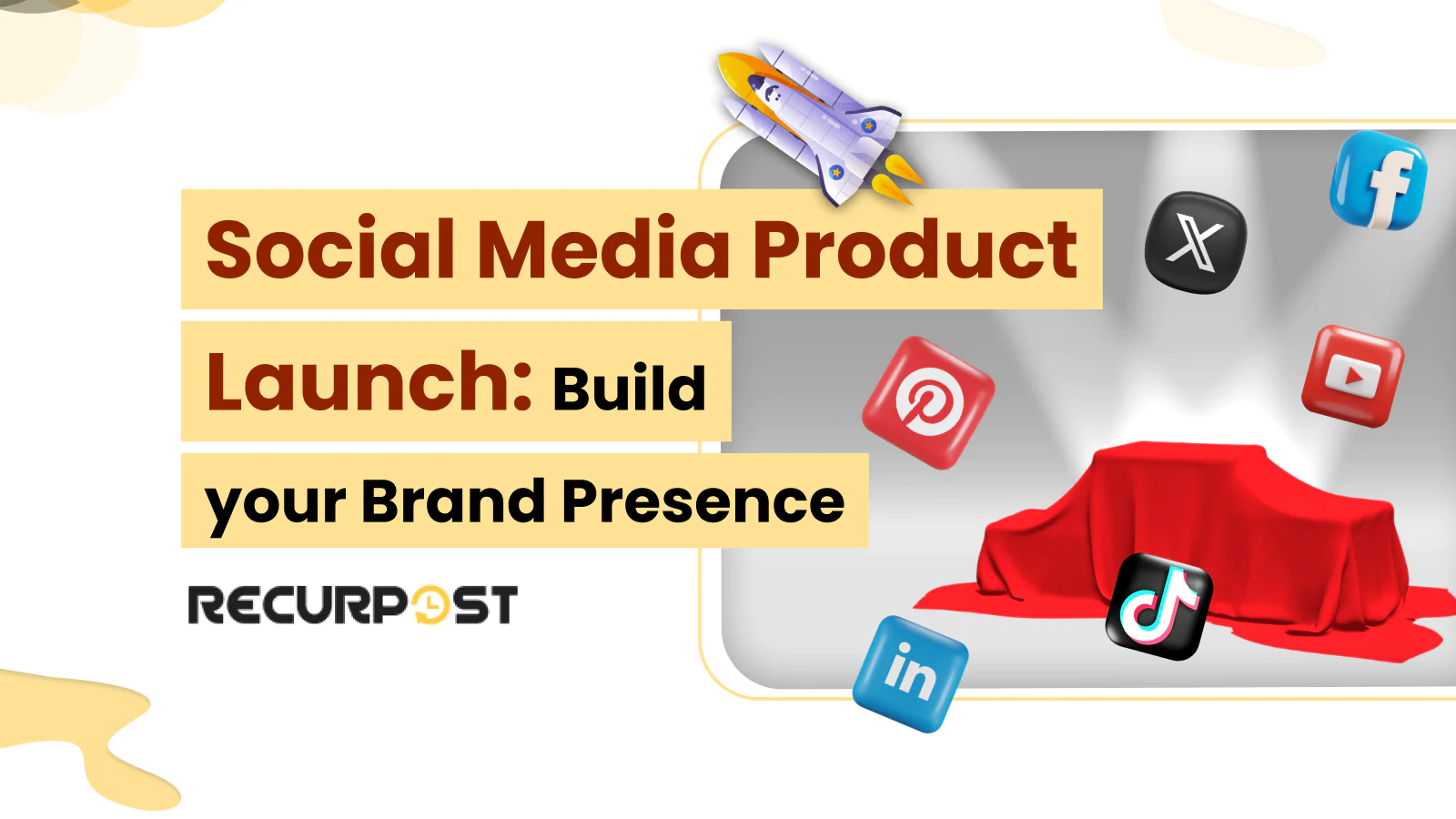Startups promoting their brand on social media skyrocket their business growth, particularly those in attention-seeking industries.
Successful brand launches require generating excitement by building buzz around your product ; this approach helps launch new products successfully.
Social media allows brands to build awareness, establish trust, attract leads, facilitate interaction, and create community through scheduled posts. Repeated exposure makes audiences anticipate your launch.
While most businesses establish a social media presence, many do so too late in their development. Brands should establish their position in consumers’ minds before beginning formal online marketing.
Launching new products combines nervousness with excitement. Products exist to sell successfully.
Social media overflows with content, with numerous brands launching products daily. This saturation makes brand visibility challenging.
Make your products or services inherently remarkable, then market them compellingly enough that users notice them amid the noise.
You can build up your organic reach on Facebook and other platforms to achieve success with your social media marketing for a unique identity.
Here is a step-by-step guide to launching your brand successfully on social media:
How to launch your new brand on social media: Start with a Plan

Step 1: Have a well-drafted plan and define what “success” means to you.
First, determine your launch objectives. While ROI represents an implicit goal, identify and document additional non-monetary goals.
Clarifying launch expectations streamlines the process by establishing clear benchmarks.
Select platforms most suitable for your product launch. Choose one or multiple social media platforms depending on your business requirements.
Your plan should include an editorial calendar, posting schedule, contests, social media strategy deck (if agencies want to show strategy to their clients or stakeholders), designs, a social media product launch template, and different creatives. It should also adapt to market changes, new products, and services.
Step 2: Know your audience
Audience knowledge forms the foundation of every marketing plan, especially for social media marketing.
Identify your audience by analyzing demographics most likely to use your product. Evaluate content from the users’ perspective, assessing whether it influences purchasing decisions.
Different social networks attract distinct audience demographics. Twitter users include 37% aged 18-25 and 25% aged 30-49, while Instagram attracts primarily millennials. Tailor content based on these demographic differences.
Don’t rush into planning your marketing strategies without including social media bulk scheduling in your strategy. Explore the variety of options and make the best of them.
Step 3: Develop anticipation on social media regarding your brand
Anticipation often exceeds the destination itself. Develop strategies to create anticipatory excitement among your audience. Make your social media presence compelling enough that followers eagerly await your updates, viewing your product favorably.
“Coming soon” posts encourage comments and conversation more effectively than surprise product announcements.

Strike a balance between mystery and transparency by revealing information gradually, keeping audiences engaged through anticipation.
Supplement social media promotion with blog content, sharing product development details and benefits for future users.
Teasers maintain audience anticipation. Social media countdowns remind followers about your launch without repetitive posting, with stories and status updates proving particularly effective for this purpose.
Step 4: Create a branded hashtag
Hashtags, though seemingly minor, play major roles in brand image development and can sometimes surpass brand names in popularity.

People recognize brands through memorable hashtags when these hashtags demonstrate sufficient creativity.
For example, the #ORIGINALS hashtag campaign was effective because of its targeted appeal to Adidas fans. It showed that the best brand hashtags can help to establish credibility for a company and elevate its position in any marketplace.
Step 5: Create Exemplary Content
Content creation forms the core of every social media campaign, including pre-launch phases requiring catchy branded content. Distribute content across pre- and post-launch periods, maintaining an aesthetic feed that gives audiences something substantive before launch.
Develop vibrant imagery and creatives across all social media accounts, beginning with product previews or service glimpses.
Create videos featuring team members discussing the brand, adding a human connection that resonates with audiences. Profiles lacking content before launch receive less trust afterward.
Step 6: Collaborate with influencers
Collaboration generates viral content by initiating conversations and inviting participation from others.
Influencers dominate social media, controlling markets and shaping opinions. Collaborating with influencers boosts brand engagement substantially.
A recent effective Instagram influencer strategy involves coordinating all influencers to post on the same day.
Collaborate with diverse influencers by sending products as PR packages. Select influencers from your industry or versatile lifestyle content creators.
Simultaneous brand mentions from multiple influencers create a viral impact for your brand.
Evoke FOMO (fear of missing out) in your audience. Product scarcity increases anticipation for launch.
For example, SHEIN is an international B2C fast fashion e-commerce platform. They were almost invisible in the online markets. They regularly collaborate with popular models and influencers by sending them clothes. This has created a huge demand for clothes from Shien.

Step 7: Prepare and schedule
Once you set a launch date, prepare thoroughly by editing photos, creating captions, adding hashtags, and scheduling posts in advance. This preparation allows you to focus on engagement and responses during launch day.
Schedule a series of posts for the launch day with the help of scheduling tools such as RecurPost, which is one of the most popular social media management tools. With advanced features such as recycling your evergreen content, making it one of the best free Hootsuite Alternatives available in the market..
You can even plan an event/party of some sort that can be streamed live on your social media accounts.
To efficiently prepare and schedule your posts, leveraging the best content calendar tools is essential. These tools streamline your workflow, allowing you to plan, organize, and publish content consistently while staying ahead of deadlines.
Step 8: Engage with your audience
Active audience engagement matters both pre and post-launch. Respond politely to queries and monitor active followers. Involve engaged followers in social media activities to make them feel included in the launch process.
Companies should share event photos and employee images, putting faces to brand names.
Avoid excessive self-promotion, which exhausts audiences. Balance promotional content with entertaining, beneficial, or inspirational material for followers.
Step 9: Analyze and optimize
Analytics represents an ongoing process from the beginning through launch. Tools like Google Analytics identify which strategies deliver results.
Measure campaign performance monthly, quarterly, and annually to identify strategies best achieving your goals.
Key metrics include social media engagement, referral traffic, and website activity, which collectively indicate strategy performance.
Evaluate how social media channels contribute to goal achievement and which approaches deliver optimal time/cost efficiency.
Track views, reads, likes, and follower growth to understand audience preferences, which guides your brand launch strategy.
How to launch a new product on social media?

Effective social media launch strategies elevate brands significantly, serving as foundations for business growth in social media. Social media product launches combine cost-effectiveness with high potential returns.
Here are some social media product launch ideas you should follow if you are to launch a new product on social media:
1. Begin creating buzz around the product before launch
Seen those teaser trailers of movies that you have been waiting for for quite a long time? Don’t they tempt you even more? That’s the whole idea behind teaser promotions. You should create buzz around a new product before it is launched to build up audience excitement and engagement.
2. Pay attention to audience queries
When you send out a teaser for a social media product launch, people will have questions out of curiosity. This is a very good opportunity for you to create engagement with the audience.
3. Release a branded hashtag and promote it
If you give a lead to a conversation, people will follow. Hashtags are a great way to reinforce your brand’s identity. Users can discover your products easily and share launch-related posts with hashtags.
4. Partner with social media influencers for product launch
Social media influencers are a huge resource for effective promotions. If you are about to launch a new product, you should connect with influencers in your domain and partner with them for promotions. They can get you an audience immediately and early on.
How to launch your business on social media?
Launching a new or an existing business on social media is tricky. Not everyone can achieve it. With the intense competition in the market, starting a social media business successfully can be challenging.
Tip: LinkedIn is excellent for networking and growing your business. To expand their email marketing list with their professional connections and network, make sure to have a business page on LinkedIn.
Here are some steps you can follow if you are to launch a business on social media:
1. Define your goals
Define clear end goals before beginning social media marketing. Precise objectives enable strategic work toward achievement.
2. Know who your audience is
Business launch posts require thorough audience knowledge. Understanding your target audience strengthens content and advertising strategies by revealing their preferences.
3. Select the right platforms and optimize your profiles
Locate your audience across social networks like Facebook, Twitter, Instagram, and LinkedIn. Establish a presence where your audience concentrates. Optimize profiles for SEO to increase visibility.
4. Implement your strategy
Social media strategies combine paid and organic approaches. Strategic planning matters because launch opportunities are limited. Implement your strategy after establishing goals, identifying target audiences, and setting up profiles.
5. Measure and improvise
Strategy implementation alone doesn’t guarantee success. Track performance metrics to identify effective and ineffective elements. Study post performance to determine audience-preferred content. Adjust content strategy based on analytics insights.
When launching a business on social media, create a clear plan outlining your goals, target audience, and key platforms. Tailoring your approach to the specific needs of your industry can make a significant difference.
How to Launch Your Business on Social Media?

Social media business launches create buzz, engage audiences, and drive sales. Well-planned product launch strategies establish foundations for brand success. Follow these steps for impactful launches.
1. Develop a Strong Brand Launch Strategy
Define goals, target audience, and key messaging before posting. Brand launch strategies should align with business vision and differentiation points. Clarity and consistency matter for both social selling platforms and retail brands.
2. Plan a Pre-Launch Teaser Campaign
Build pre-launch excitement with engaging Instagram content, including behind-the-scenes material, sneak peeks, and countdowns. Create early interest through catchy product launch posts combining engaging visuals with compelling captions.
3. Create a Social Media Launch Plan
Use social media launch plan templates to outline posting schedules, ensuring consistent content flow before and after launch. Well-structured plans include teasers before launch, announcement posts on launch day, and engagement-driven content after launch.
- Teasers (before launch)
- Announcement posts (on launch day)
- Engagement-driven content (after launch)
4. Craft Compelling Launch Posts
Create strong first impressions through launch posts highlighting unique selling points. Craft engaging captions telling your story and inspiring action. Effective launch post formats include bold announcements with high-quality images, short brand introduction videos, and customer testimonials when available.
- A bold announcement with a high-quality product image
- A short video introducing your brand
- A customer testimonial (if available)
Catchy Product Launch Social Media Post Ideas
Creating engaging posts for your product launch can significantly boost visibility and conversions. Here are proven post formats that capture attention and drive action:
Before-and-After Demonstrations
Show the problem your product solves with a clear before-and-after comparison. Caption: “What used to take [time/effort] now takes just [reduced time/effort] with [Product Name]. Available now! #ProductLaunch”
Limited-Time Offer Announcements
Create urgency with special launch pricing. Example: “The wait is over! [Product Name] is here, and the first 100 customers get 25% off with code LAUNCH25. Link in bio. #NewProduct”
User-Generated Unboxing
If you’ve sent pre-launch products to customers or influencers, share their unboxing experiences. Caption: “See what @username thought when they first tried [Product Name]! Now available for everyone at [link]. #FirstImpression”
Problem-Solution Showcase
Present a common pain point and show your product solving it in a short video. Caption: “Tired of [problem]? [Product Name] makes it simple with [key feature]. See how it works! #ProblemSolved”
Behind-the-Scenes Journey
Share the product development story. Caption: “From idea to reality: It took [time period] and [interesting fact] to perfect [Product Name]. Today, we’re thrilled to share it with you! #BehindTheScenes”
Customer Testimonial Spotlight
Highlight early customer feedback. Caption: “Don’t take our word for it! Here’s what @customer said after trying [Product Name] for just one week. Ready to experience it yourself? #RealResults”
Interactive Polls or Questions
Engage followers with questions about the product. Example: “Our new [Product Name] comes in 4 colors. Which one will you choose? Comment below! #NewLaunch”
These post ideas can be customized to fit your brand voice and product specifics while maintaining the engagement elements that make them effective. Studying successful social media product launch examples from your industry can further inform your strategy.
5. Showcase Your Brand Mission
People connect with purposeful brands. Share posts communicating values, vision, and brand significance to build trust and strengthen customer relationships.
6. Engage Your Audience & Encourage Sharing
Promote content sharing through interactive posts, giveaways, and branded hashtags. Retail brand launches benefit from influencer and micro-influencer collaborations, expanding reach.
How to Introduce Your New Business on Social Media: Examples and Tips

Launching a new business is exciting, but creating a buzz online requires a well-thought-out social media strategy for a product launch. Here’s how you can craft a successful brand launch campaign on social media and captivate your audience.
1. Define Your Brand Mission
Before diving into your social media efforts, clarify what your brand stands for. Showcase your brand mission of great ideas by sharing a post that tells your story. This builds a connection with your audience from day one.
2. Plan Your Social Media Launch
Create a social media launch plan template or use any of these from RecurPost. You must have a template that outlines your goals, platforms, and posting schedule. Looking at pre launch social media posts examples can provide inspiration for your own campaign. Looking at pre launch social media posts examples can provide inspiration for your own campaign. Whether you’re launching a social selling platform or a physical store, this framework ensures a seamless rollout.
3. Build Pre-Launch Buzz
Leverage pre-launch Instagram post ideas to build anticipation. Share sneak peeks, countdowns, and teasers that spark curiosity and excitement. Use catchy product launch social media posts to keep your audience engaged and guessing.
4. Execute a Memorable Launch Campaign
A strong brand launch strategy includes a mix of content formats: videos, carousel posts, live streams, and behind-the-scenes snippets. Post regularly and use creative brand launch captions to convey your enthusiasm and invite your followers to join the celebration.
5. Tailor Posts to Your Industry
If you’re preparing to launch a brand in retail, focus on visual storytelling to showcase your products. For digital services or apps, emphasize functionality and user benefits in your new product launch social media post.
6. Engage with Your Audience
Ask questions, run polls, and respond to comments. This interaction builds trust and encourages followers to share your content. Share customer testimonials or shoutouts as part of your brand launch campaign.
7. Post-Launch Momentum
Once you’ve gone live, continue the excitement with thoughtful launch post ideas, such as sharing the story behind your first sale or highlighting milestone achievements.
By following these tips on launching a new brand, you can create a buzzworthy introduction on social media. Whether it’s a bold visual campaign or an inspiring brand launch strategy, remember that authentic storytelling and engagement are your keys to success.
Structuring Your Pre-Launch Campaign
A well-structured pre-launch campaign typically spans 4-6 weeks before your official launch date. Here’s how to organize it effectively:
4-6 Weeks Before Launch
- Introduce your brand story and mission
- Share behind-the-scenes content of product development
- Begin building your email list with a coming soon page
3-4 Weeks Before Launch
- Reveal your logo and brand identity elements
- Start your branded hashtag campaign
- Release teaser content highlighting product features
2 Weeks Before Launch
- Share customer testimonials from beta testers
- Announce any special launch offers or promotions
- Begin countdown posts across all platforms
1 Week Before Launch
- Intensify posting frequency with daily countdown posts
- Release a preview video or detailed product images
- Announce any launch events or live streams
Launch Day
- Post your official announcement across all platforms
- Go live to engage with your audience in real-time
- Activate all influencer partnerships simultaneously
This structured approach builds momentum gradually while maintaining audience interest throughout the pre-launch period.
How to Introduce a New Logo on Social Media
Introducing a new logo requires strategic planning to ensure recognition and positive reception. Here’s how to effectively unveil your new logo on social media:
1. Tell the Story Behind the Design
Share the meaning behind your new logo elements, colors, and typography. Explain how it represents your brand values and vision. This narrative creates an emotional connection and helps audiences understand the rationale for the change.
2. Create a Reveal Sequence
Build anticipation with a series of posts:
- Start with subtle hints about an upcoming change
- Share design elements or color palette snippets
- Post side-by-side comparisons of old and new logos
- Finally, reveal the complete new logo with a detailed explanation
3. Demonstrate the Logo in Context
Show your new logo applied to products, packaging, website, or business materials. This helps followers visualize the logo in real-world applications and reinforces brand recognition.
4. Create a Logo Animation
Develop a short animation that transforms your old logo into the new one, or simply engagingly animates your new logo. This is highly shareable content that draws attention to your rebrand.
5. Address Questions and Feedback
Be prepared to respond to follower reactions. Have clear explanations ready for common questions about why you changed your logo and what it represents.
6. Update All Platform Visuals Simultaneously
Coordinate the update of profile pictures, cover images, and templates across all social platforms to happen at the same time. This creates a cohesive impression and reinforces the change.
A logo introduction should feel like an evolution rather than an abrupt change, even if the design is dramatically different. The key is bringing your audience along on the journey.
Effective Brand Announcement Examples
When introducing your brand on social media, having concrete examples can guide your approach. Here are some effective brand announcement formats that have proven successful:
The Story-Driven Announcement
“We started [Brand Name] because we noticed [problem]. After [time period] of development, we’re thrilled to introduce [product/service] with [key benefit]. Join us on our mission to [brand purpose].”
The Value Proposition Announcement
“Introducing [Brand Name]: We help [target audience] achieve [desired outcome] without [pain point]. Available now at [website/location]. Use code LAUNCH for [special offer].”
The Visual Reveal
A series of three images: first showing a teaser, second revealing part of your product/logo, and third displaying the complete brand with a caption like “The wait is over. [Brand Name] has arrived. [Tagline].”
The Founder Introduction
“Meet the team behind [Brand Name]. We’re [founders’ names], and we’re passionate about [industry/problem]. Today, we’re launching our [product/service] designed to [benefit]. Follow our journey as we [mission statement].”
These templates can be customized to match your brand voice while maintaining the essential elements that make announcements engaging and shareable.
Best Social Media Tactics for Product Launches on Social Media
By social media product launches definition, they are coordinated marketing campaigns that introduce new products to the market through social platforms. Product launches can be super exciting and dreadful at the same time. As a marketer, you need a solid social media product launch strategy to ensure the perfect product release. Here are some tactics that will help you do better:
- Conduct thorough research on your audience
- Release teasers before launch
- Create branded hashtags
- Convey a story through your posts
- Collaborate with local businesses or artists
- Host giveaways
- Start your own blog and publish content
If coordinating every detail feels overwhelming, consider outsourcing your Social Media Marketing to professionals. With expert support, you can streamline your launch strategy, ensuring each post resonates with your audience and maximizes your brand’s reach on launch day.
How to Relaunch Your Business on Social Media
Relaunching an existing business on social media requires a different approach than launching a new brand. Whether you’re refreshing your brand identity, pivoting your business model, or re-entering the market after a hiatus, these strategies will help you make a successful comeback:
1. Audit Your Previous Social Media Presence
Before planning your relaunch, analyze what worked and what didn’t in your previous social media efforts. Identify your best-performing content, audience engagement patterns, and areas for improvement.
2. Communicate Your Evolution Story
Share the journey that led to your relaunch. Transparency about why you’re relaunching builds trust with both existing and new followers. Focus on how the changes benefit your customers rather than just internal business reasons.
3. Refresh Your Visual Identity
Update your profile pictures, cover images, and content templates to reflect your new brand identity. Ensure consistency across all platforms while making the visual change noticeable enough to signal the relaunch.
4. Create a Relaunch Campaign Calendar
Develop a dedicated content calendar for your relaunch that includes:
- Teaser content hinting at the coming changes
- The official relaunch announcement
- Educational content explaining new features or offerings
- Customer testimonials supporting your new direction
5. Reconnect With Your Existing Community
Personally reach out to loyal customers and followers to preview your relaunch. Their early support can amplify your announcement and provide valuable initial feedback.
6. Consider a Special Relaunch Offer
Create exclusive promotions for both returning customers and new followers. This incentivizes engagement with your refreshed brand and generates immediate sales momentum.
7. Host a Relaunch Event
Organize a virtual or physical event to celebrate your relaunch. This could be a live stream, webinar, or in-store event that showcases your new direction and reconnects you with your community.
8. Leverage Paid Promotion Strategically
Allocate a budget for targeted ads announcing your relaunch to both previous customers and new potential audiences who match your ideal customer profile.
A successful relaunch maintains the equity you’ve built while clearly communicating your brand’s evolution. The key is balancing continuity with the excitement of something new.
Conclusion
Markets and economies fluctuate unpredictably in our dynamic world. Social media blogs provide insights and strategies for navigating these uncertainties.
Develop unique approaches rather than relying on textbook methods for social media brand growth. Utilize new social network features to captivate audiences.
Converting audience fascination into customer loyalty requires quality products/services matching campaign promises. Exaggerated campaigns delivering disappointing products damage brands long-term. This is where understanding what a social media agency does becomes crucial, they help craft realistic, effective strategies that align with your brand values and audience expectations.
Brand trust drives purchasing decisions, particularly on social media. Established credibility makes customers recognize value in offerings. Prioritize credibility as a long-term goal.
For creating your brand, you’ll need to put in a ton of effort on social media and stay consistent. But, handwork is the only thing that will yield results.
Frequently asked questions
1. What is a social media launch strategy?
A social media launch strategy can be explained as how you strategize and optimize the release of your brand or product on social media. There are a lot of aspects involved while doing this. You will have to strategize on attracting followers, make sales, and convert your existing audience into customers.
2. How do you announce a new product on social media using social media strategies?
You can use the following strategies to launch your product on social media successfully:
– Create a hashtag campaign
– Release creative promotional deals
– Always tell a story through your content
– Send out teasers or sneak peeks
– Collaborate with local influencers
– Host giveaways
3. How to launch a new brand on social media?
Here are some of the steps you can use while launching a new brand on social media:
– Define brand identity and target audience.
– Define brand identity and target audience.
– Tease the launch with sneak peeks.
– Create compelling visuals and messaging.
– Collaborate with influencers.
4. How to launch a business on social media?
Here are some of the steps that you can use while launching your business on social media:
– Define your business goals.
– Set up business profiles on relevant social media platforms.
– Create a compelling bio and profile picture that represents your brand.
– Develop a content strategy with engaging visuals and messages.
– Engage with your audience and respond to comments and messages promptly.
– Run promotions or contests to attract new followers.
– Collaborate with influencers or partners.
– Consistently post and stay active on social media to build brand presence.
5. How to build anticipation socially?
Here are some tips that you can use to build anticipation on social media:
– Use teaser content and sneak peeks.
– Create suspense and curiosity.
– Post countdowns to the launch.
– Run contests or giveaways.
– Engage with your audience.
– Collaborate with influencers.
– Use captivating visuals and storytelling.
– Utilize exclusive previews or behind-the-scenes content.
6. How to introduce your brand on Social media?
Here are some of the ways that you can use when introducing a new brand;
– Use eye-catching visuals and storytelling to create interest.
– Utilize social media ads to reach a broader audience.
– Run a social media campaign with a unique hashtag.
– Collaborate with influencers
7. What are the key steps and considerations involved in launching a social selling platform?
The key steps and considerations involved in launching a social selling platform include;
– Conduct market research to understand the preferences of buyers and sellers.
– Develop a user-friendly platform.
– Provide robust security measures to protect users’ data and transactions.
– Utilize social media advertising
– Collaborate with popular brands or influencers to gain credibility.
– Build a strong customer support team to assist users.
8. What is the first step in launching a social media marketing campaign?
Define your goals and target audience. Clearly outline what you want to achieve and who you aim to reach.
9. How to run a social media campaign?
Create a strategy with defined goals, craft engaging content, schedule posts consistently, monitor performance, and engage with your audience to optimize results.
10. How to announce a collaboration on social media?
Use a visually appealing post with a clear message, tag your collaborator, and share the benefits of the partnership. Include a compelling call-to-action for followers to engage.

Debbie Moran is a Digital marketing strategist with 5+ years of experience producing advertising for brands and helping leaders showcase their brand to the correct audience. She has been a part of RecurPost since 2019 and handles all the activities required to grow our brand’s online presence.





